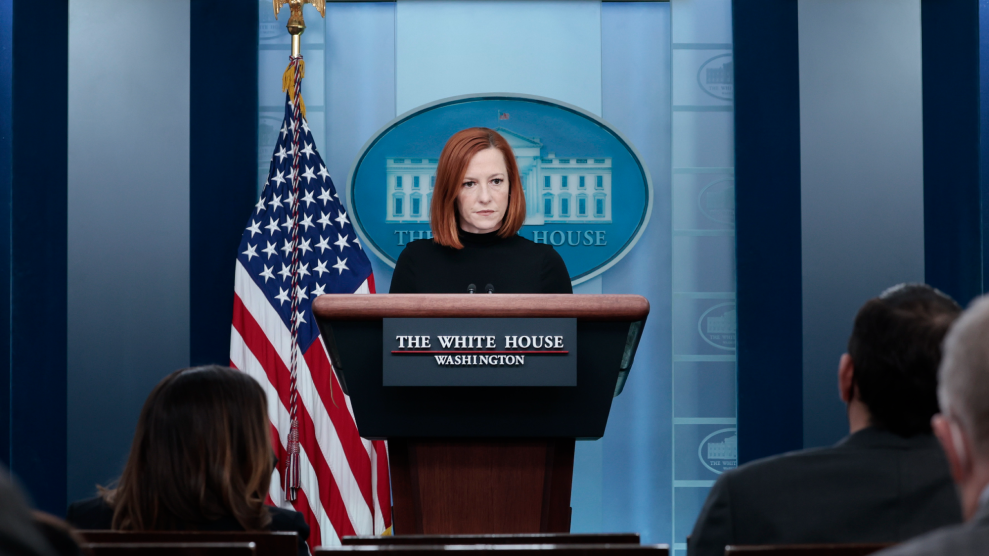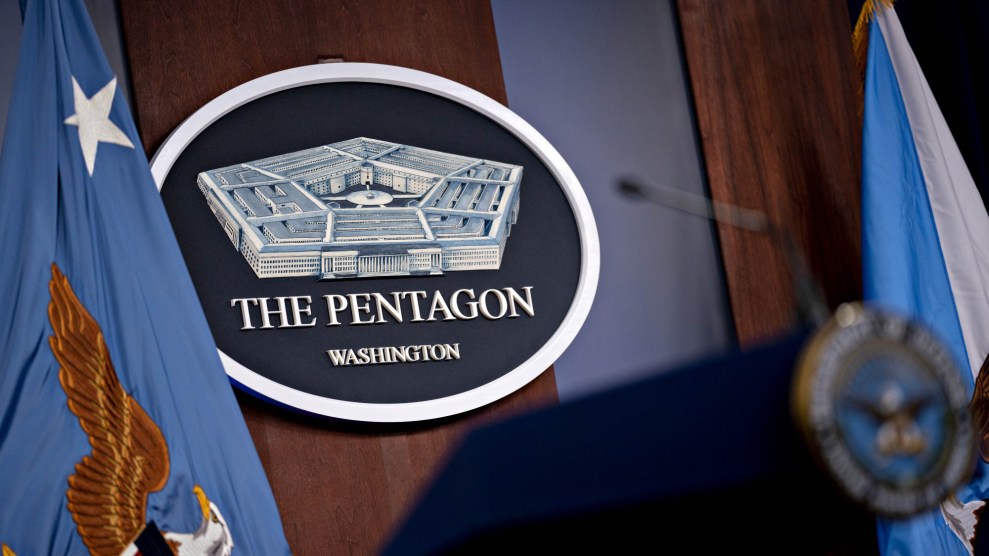
White House press secretary Jen Psaki during the daily White House press briefing on February 2. Anna Moneymaker/Getty
In America, you can question or criticize your government and its claims, even if your views overlap with the views of foreign adversaries. The First Amendment, as they say, protects the assholes.
But some people could use a refresher course. On Wednesday, White House Press Secretary Jen Psaki accused Sen. Josh Hawley—who had questioned the administration’s insistence on leaving the door open for Ukraine to join NATO one day—of “parroting Russian talking points.” For this comment, Psaki was rewarded with a smattering of criticism, but plenty of press and social media amplification.
Hawley, a Missouri Republican who appeared to cheer on the Capitol insurrectionists last January 6, and then voted against certifying President Joe Biden’s election win, is easy enough to paint as anti-American. And Russia’s belligerent behavior toward Ukraine makes it easy enough to dismiss serious consideration of the Kremlin’s concerns about NATO expansion.
But Psaki didn’t stop there. On Thursday, she and State Department spokesman Ned Price both seemed to suggest that people who refuse to accept the administration’s claims as gospel are trusting America’s adversaries over their own government, as the Washington Post’s Felcia Sonmez detailed.
At a State Department briefing on Thursday, reporters pressed Price for evidence to support the claim that Russia plans to fake an attack on its own forces as a pretext to invade Ukraine. Price insisted that the need to protect intelligence sources and methods prevented his sharing of more details. Fair enough. But he also told the AP’s veteran diplomatic reporter Matt Lee: “If you doubt the credibility of the US government, of the British government, of other governments and want to, you know, find solace in information the Russians are putting out, that is for you to do.”
Psaki seemed to follow a similar logic when reporters aboard Air Force One demanded evidence to support the administration’s account of the US Special Operations mission Wednesday, which killed the reputed leader of the Islamic State. Specifically, NPR White House correspondent Ayesha Rascoe sought more details to bolster President Biden’s claim that it was a suicide bomb detonated by ISIS leader Abu Ibrahim al-Hashimi al-Qurayshi, and not American munitions, that killed al-Qurayshi’s wife and their two children.
“There may be people that are skeptical of the events that took place and what happened to the civilians,” Rascoe explained. Psaki responded, in part, by asking Rascoe whether those people think the military is “not providing accurate information…and ISIS is providing accurate information?”
Psaki did note, too, that the Defense Department has a process for reviewing civilian deaths, which was underway, and that the White House would release all the details it can. But that doesn’t get her off the hook. The military has routinely lied to the public about its track record, dating back long before the war in Vietnam and the occupations of Iraq and Afghanistan. Eric Schlosser revealed in his 2013 book Command and Control, for example, how the Air Force lied outrageously to cover up nuclear blunders that put innocent civilians, including Americans, in terrible danger. In Afghanistan and in Syria, just during the last few years, the military has killed civilians and misrepresented what took place.
Defense Secretary Lloyd Austin recently ordered the Pentagon to strengthen efforts to prevent civilian deaths, and improve investigations of civilian casualties. The move came in response to investigative news reports, including a New York Times series that linked hundreds of civilian deaths in Syria to an American special forces unit that apparently lied to bypass Pentagon restrictions meant to protect innocents from being bombed.
So yes, the US military often does fail to provide accurate information on civilian deaths, and sometimes lies outright. That’s an easy one. Americans can be skeptical of its claims without being on the side of ISIS. The administration’s responses drew more pushback Thursday from reporters—and a few lawmakers:
Listen it’s just not a great idea to say that critics of national security policy are siding with the enemy. Engage on the policy argument instead.
— Chris Murphy (@ChrisMurphyCT) February 3, 2022
Both Psaki and Price later walked back their rhetoric a bit. Psaki tweeted that “of course [Rascoe’s] is a valid question and I treated it as such.” Price tweeted that Lee is “no one’s dupe, and I’d never want to suggest otherwise.”
A senior administration official, after initially declining to comment on the fracas, said: “We welcome good faith scrutiny. Our spokespeople hold daily briefings where they answer tough questions from smart journalists to the best of our ability—as Jen and Ned tweeted.”
Let’s be clear, though. Josh Hawley may not, as Psaki asserted, support “longstanding bipartisan American values.” But his views on NATO aren’t evidence of such. Nor are they treasonous. Hawley’s critics would be wise not to let his noxiousness cause them to overlook the problem with the White House’s attack on him. Equating healthy skepticism to sympathy with America’s enemies is a disingenuous—and dangerous—direction for the Biden administration.

















